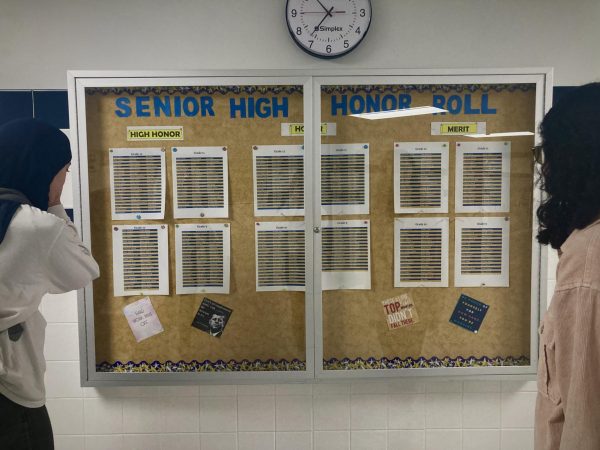 Many students have had those nights where it feels as if they’re drowning in their work. Scattered papers and a Chromebook on display, a glaring bright screen and dull pages stare. Eyes glance at the clock, wondering how much time is left. A strained brain aches to finish homework and studying. A strained brain aches for the perfect grade.
Many students have had those nights where it feels as if they’re drowning in their work. Scattered papers and a Chromebook on display, a glaring bright screen and dull pages stare. Eyes glance at the clock, wondering how much time is left. A strained brain aches to finish homework and studying. A strained brain aches for the perfect grade.
School is where learning is meant to take place. Minds are supposed to grow and gain more knowledge. Yet the numbers seem to haunt the corners of many students’ minds. Especially in Victor Senior High School, students are encouraged to strive for academic excellence.
But do these numbers take away from the actual meaning of school?
Are these expectations too much?
SchoolTool is used to keep track of assignments and grades. This makes grades more accessible and clear for teachers, students, and parents. Though this can be helpful, it may be contributing to the problem of prioritizing grades over learning.
Mr. Hawkinson, an English teacher at Victor Senior High explains the ambivalence of SchoolTool, “I think it’s good because it’s more transparent […] but it also leads to sort of an obsession or perseveration on grades, which I don’t know it’s all that healthy.”
Hawkinson clarified that the problem is how students focus on “the difference between a ninety-four and a ninety-three.” He puts emphasis on the significance that just one point carries. Students are hyper fixating on their grades, aiming for nothing less than perfection.

Student grades from each class are on display in SchoolTool, but that’s not the only place that they’re on display. On the walls of Victor Senior High there’s a display of different grade categories: High Honor Roll, Honor Roll, and Merit Roll in glass cases.
Student names are placed under one of the three categories on papers which indicate where their grades stand. High goals are projected onto students. This may encourage students to work hard and try their best in classes, but it can also make students feel a certain way when they don’t see the grades they want.
When they aren’t satisfied, students begin to focus on grades more than anything. Mr. Hawkinson supports this idea, “I know it’s important like we post a high honor roll and honor roll for students, but I think sometimes the open grading system is all about the grades instead of the improvement.”
Improvement and learning is important, so when these are ignored and focus is elsewhere, no learning is done. Students will focus on getting their grade up instead of fully comprehending the material.
With this, it seems as if students would rather have an inflated grade than to actually learn. Whether they’re attempting to get their grades up for college, their parents, or just themselves, recently it seems students tend to focus on only the number. If you could have one late night study session and get a 90 on that test, why put in any more effort than that?
Fully understanding a subject is important yet it is put on the back burner. Grades are meant to represent how well a student is doing in class, but it’s hard to say whether these numbers are showing a student’s effort or not.
This is where a new question emerges: do students’ grades reflect their work? Ava Bivona, Sophomore at Victor Senior High, shared her opinion, “[Grades] definitely [don’t reflect student work] because someone can try really hard but just not be a good test taker, and [their work] outside of school isn’t always reflected.”
Grades may seem simple, you either put effort into learning or don’t. But for certain students, this is not the case. They put effort into classes, but the effort is just not reflected. Tests can cause this dilemma in communication. Taking tests induce anxiety for many. These anxious feelings can stop a student from showing their full potential and how much they’ve learned.
Factors like these put a wall between students and expectations, high expectations become even tougher to obtain. Students have an obligation to reach these expectations. Therefore, some will dive deep into schoolwork in an attempt to succeed but end up drowning in the stress of it all. When one doesn’t reach these expectations it can make them feel negative towards themselves, even when the goals they are aiming for are very high.
Everyone has a different opinion on high and low grades though. Some are proud of themselves for merely passing, and some get disappointed when they look down at their paper and see a 90 staring back at them.
When it comes to grades, anything under a 65 is failing and anything 85 or above is considered mastery. But those who I interviewed consistently claimed that an 80 is a bad grade. This mirrors the pressure and expectations put upon students.
These standards illustrate that striving for excellence is more than just a motto or goal, and today it is embedded into student minds in an unhealthy way.



















